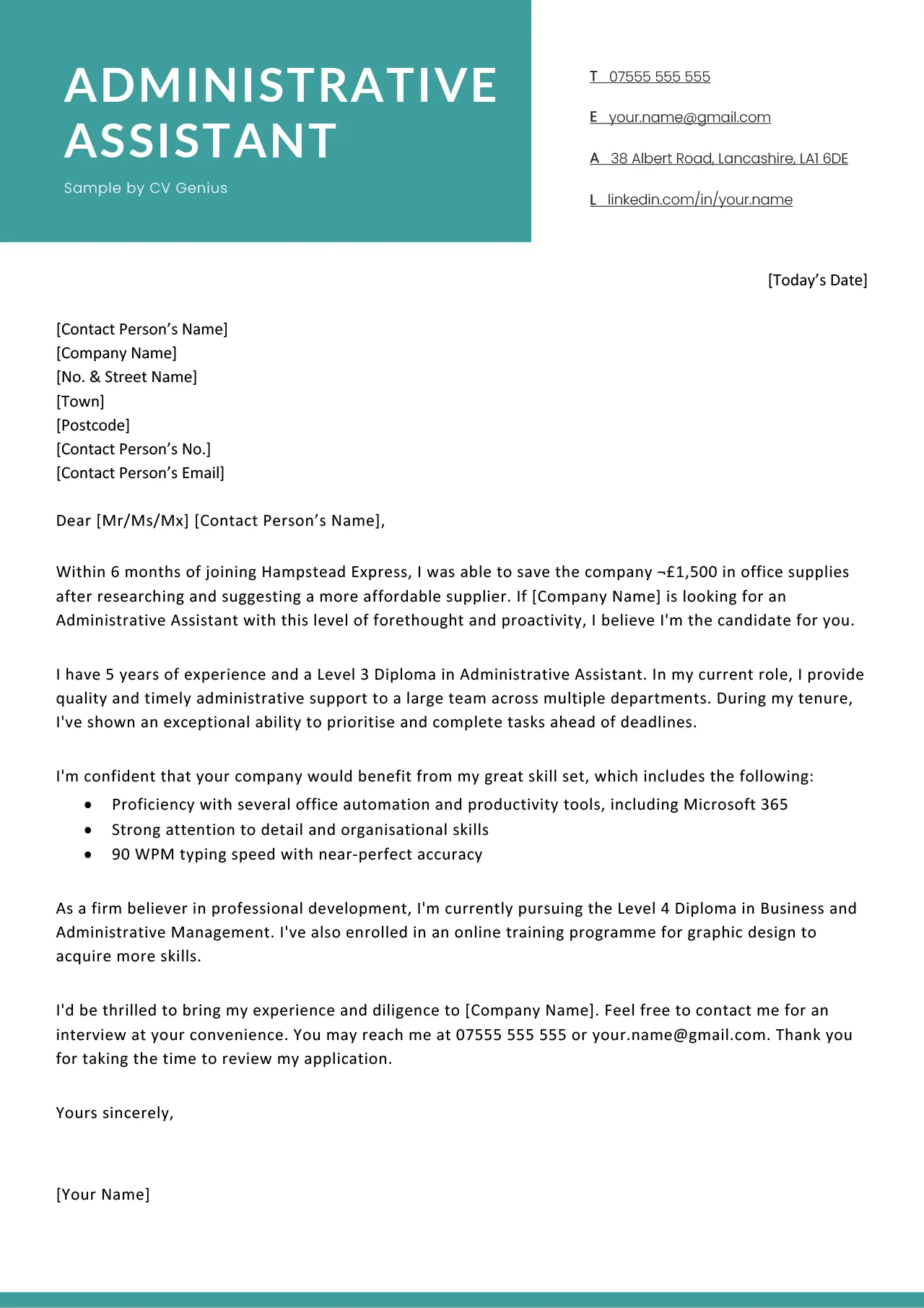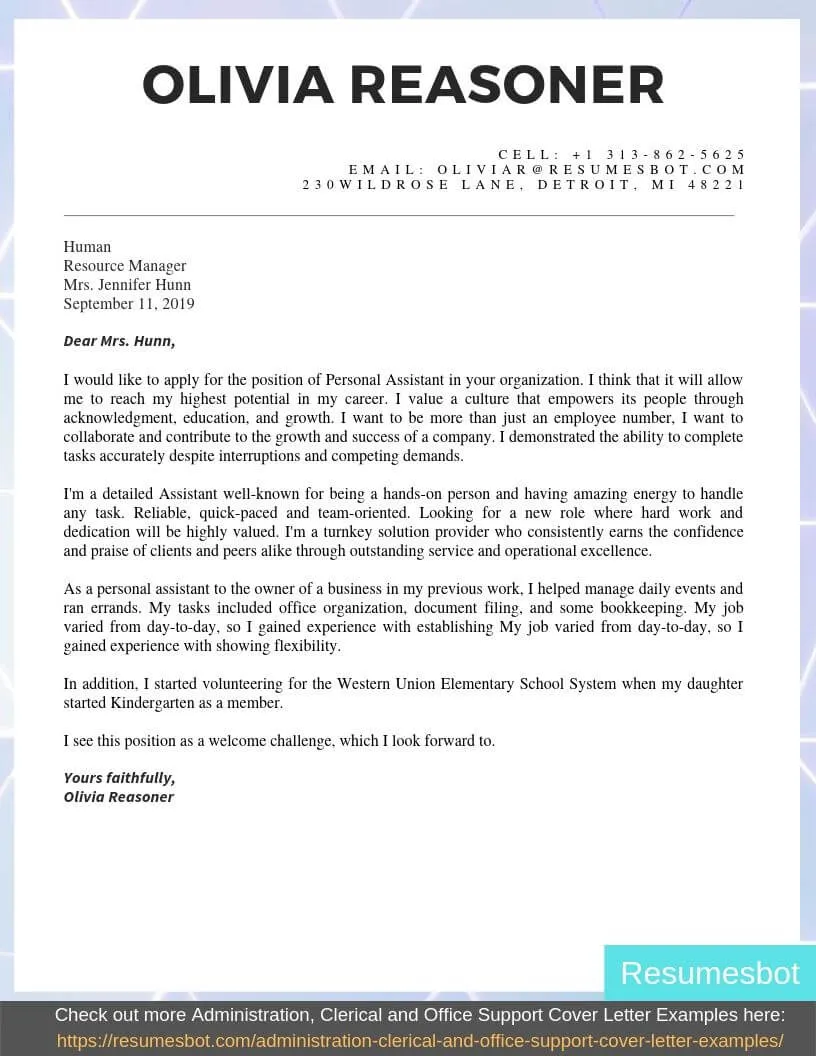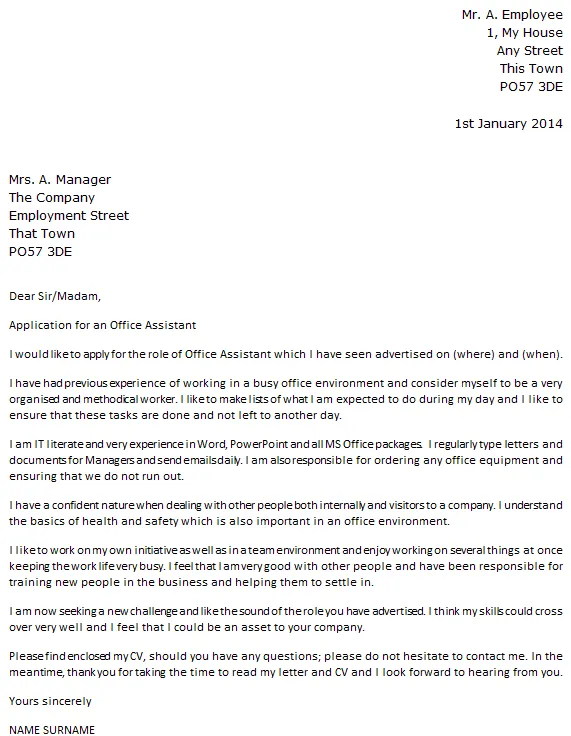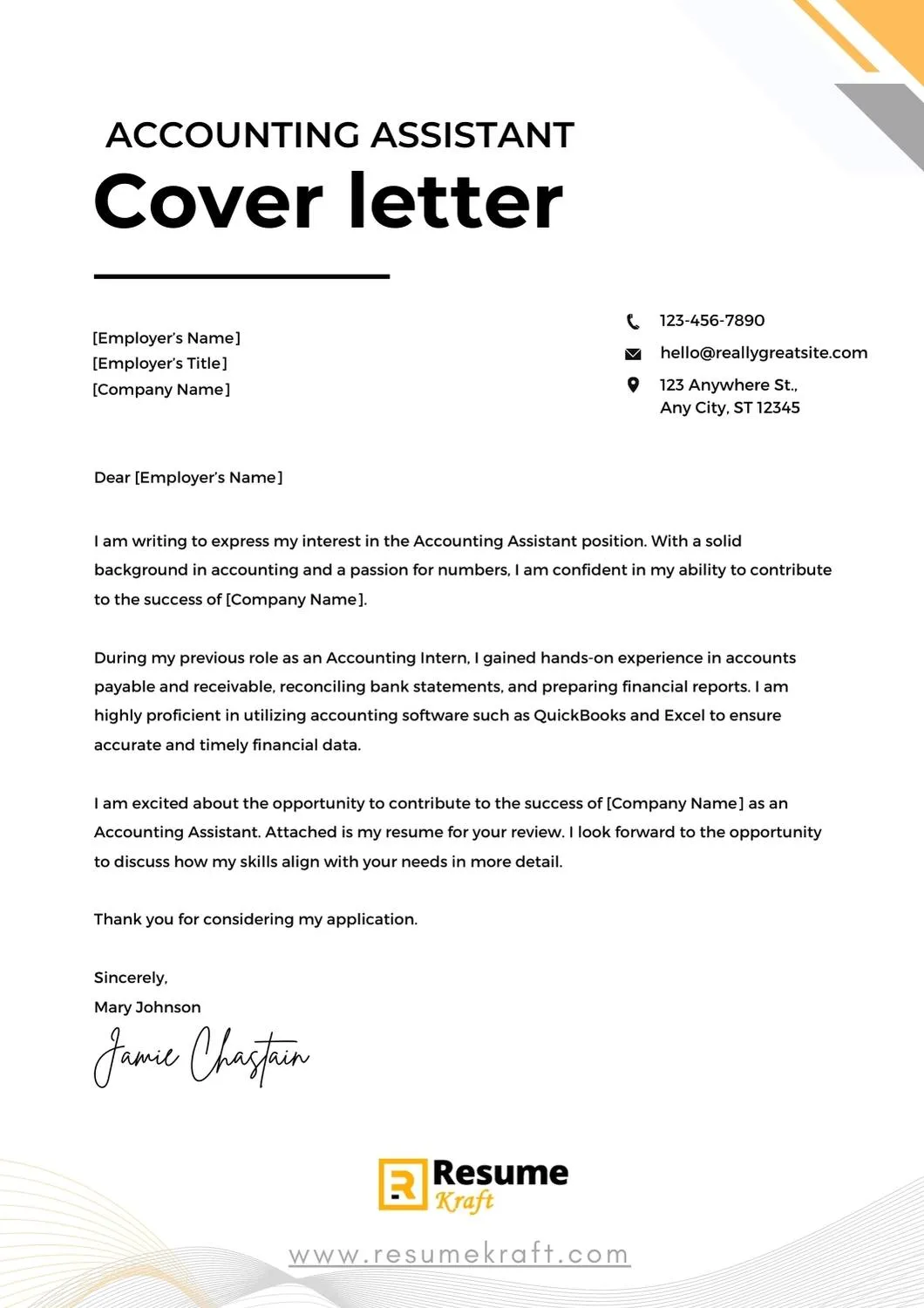Understanding the Assistant Job Cover Letter
A cover letter for an assistant job is your initial introduction to a potential employer, serving as the first impression before they delve into your resume. It’s your chance to demonstrate your understanding of the role, express your interest, and highlight how your skills and experience align with the job requirements. A well-crafted cover letter is not merely a repetition of your resume; instead, it provides context, showcases your personality, and explains why you are the ideal candidate for the position. Think of it as a personal sales pitch, where you ‘sell’ your abilities and enthusiasm to the hiring manager. It’s an opportunity to differentiate yourself from other applicants and make a memorable impact.
The primary goal of a cover letter is to capture the reader’s attention and encourage them to review your resume. It should be concise, compelling, and tailored to the specific job you’re applying for. The content should demonstrate that you understand the company’s needs and explain how you can contribute to their success. A generic cover letter is easily recognizable and often leads to an instant rejection. Personalization and a genuine interest in the role are key to making a positive impression. Remember, the cover letter sets the tone for your entire application and influences the employer’s perception of your suitability for the job.
Key Elements of a Strong Cover Letter
A strong cover letter includes several key elements that work together to present you as a well-suited candidate. Firstly, it requires a professional header with your contact information and the date. Secondly, a formal salutation, such as ‘Dear [Hiring Manager Name]’ (if you know it), or ‘Dear [Company Name] Hiring Team’ is recommended. The body of the letter should be divided into logical paragraphs. The introduction should state the position you are applying for and how you found the job posting. The body should highlight your relevant skills and experiences, providing specific examples of how you have excelled in previous roles. Finally, a clear and concise conclusion that summarizes your interest and includes a call to action is a must. A well-structured cover letter demonstrates your organizational skills and attention to detail.
The language used throughout the cover letter is critical. Use action verbs, quantify your achievements whenever possible (e.g., ‘Managed a team of 5 and increased efficiency by 15%’), and keep your tone professional and enthusiastic. Avoid jargon or overly complex language. The focus should be on the value you bring to the company, not just listing your responsibilities. Tailoring the letter to the specific job description is essential; carefully review the requirements and address each one in your letter. Ensure that the cover letter aligns with your resume, reinforcing your key qualifications and experiences. Remember to proofread for any grammatical errors or typos, which can detract from your professionalism.
Formatting Your Cover Letter for Assistant Jobs

The format of your cover letter is just as important as its content. Choose a professional, easy-to-read font such as Arial, Calibri, or Times New Roman, with a font size between 10 and 12 points. The letter should be single-spaced with a space between each paragraph. Maintain consistent margins (typically one inch) on all sides. Use a clear and logical structure to organize the information, making it easy for the hiring manager to quickly grasp your key qualifications and interests. A well-formatted cover letter presents you as organized, detail-oriented, and professional.
The layout should be visually appealing and uncluttered. Avoid using excessive bolding, italics, or underlining, as these can distract the reader. Use bullet points or numbered lists if you are highlighting multiple achievements or skills. Keep the cover letter concise, ideally no more than one page. Use short paragraphs and avoid dense blocks of text. Break up the text with sufficient white space to make it easier to read. Make sure to save the cover letter in a professional format, such as a PDF, to preserve the formatting and ensure compatibility across different devices and operating systems. Consistent formatting reflects your professionalism and attention to detail.
Highlighting Your Skills and Experience
When highlighting your skills and experience, focus on those that align with the specific requirements outlined in the job description. Identify the key skills and qualifications the employer is seeking and provide specific examples of how you have demonstrated these in the past. Use action verbs to describe your accomplishments and quantify your results whenever possible. For example, instead of saying ‘Managed office tasks,’ you could write ‘Managed office tasks, including scheduling meetings, managing correspondence, and ordering supplies, leading to a 10% reduction in operational costs.’ This adds credibility and demonstrates your ability to deliver tangible results.
Show, don’t just tell; provide concrete examples of your achievements. If the job requires strong organizational skills, describe how you have successfully managed multiple projects simultaneously or implemented systems that improved efficiency. If the job requires customer service skills, share an experience where you resolved a difficult customer issue and achieved a positive outcome. Furthermore, demonstrate your ability to adapt and learn by highlighting relevant training or certifications. Show how you’ve continuously improved your skills and knowledge, and align your experiences with the responsibilities of the assistant job. Remember to tailor this to each application and to emphasize the most relevant points.
Tailoring Your Cover Letter to the Job Description
Tailoring your cover letter to the specific job description is crucial to showing your genuine interest and understanding of the role. Carefully read the job description and identify the key requirements, skills, and qualifications the employer is seeking. Use this information to customize your cover letter, addressing each requirement directly. The goal is to demonstrate that you understand the company’s needs and possess the skills and experience necessary to excel in the position. A generic cover letter will not make a strong impression, so take the time to personalize each application.
Use the same keywords and phrases from the job description in your cover letter, but avoid simply repeating them. Instead, integrate these keywords naturally into your writing while explaining how your skills and experience align with the specific requirements of the role. Research the company and the role. Mention the company by name and address specific aspects of the company’s mission, values, or recent projects to show your genuine interest. Focus on your accomplishments and how you can contribute to the company’s goals. This level of detail shows the hiring manager that you have taken the initiative to understand the position and the company’s culture.
Proofreading and Editing Your Cover Letter

Proofreading and editing are essential steps in the cover letter writing process. Errors in grammar, spelling, or punctuation can create a negative impression, regardless of your qualifications. After completing your first draft, take a break and return to the letter with fresh eyes. Read it aloud to catch any awkward phrasing or inconsistencies. Check for typos, grammatical errors, and ensure that your sentences are clear and concise. Use a grammar checker and spell checker, but don’t rely solely on these tools; they may not catch all errors, especially those related to context.
Consider asking a friend, family member, or career advisor to proofread your cover letter. A second pair of eyes can often spot errors you might have missed. Ensure consistency in formatting and tone throughout the letter. Make sure your contact information is correct and that the formatting is professional. Ensure that all the elements align with each other. It is important to ensure that the formatting is uniform and that the tone matches the job and the company. A polished and error-free cover letter demonstrates your attention to detail and commitment to excellence, giving you a competitive edge.
Writing a Compelling Opening
The opening of your cover letter is critical, as it is the first chance to capture the hiring manager’s attention. Avoid generic openings like ‘I am writing to apply for the position of…’ Instead, start with a strong statement that immediately grabs the reader’s attention and states your interest in the role. This can include a brief summary of your most relevant skill or accomplishment or a mention of why you are excited about the opportunity. Clearly state the position you are applying for and where you found the job posting. Use the company name and a specific reference to the role to demonstrate that you understand the specifics of the job.
The opening should convey enthusiasm and your understanding of the company’s needs. You could also mention a specific project or aspect of the company that interests you to show that you have done your research. A well-written opening sets the tone for the entire letter and encourages the reader to continue. It’s your opportunity to make a strong first impression and differentiate yourself from other applicants. By conveying confidence and excitement, you can immediately make the reader want to learn more about you and your qualifications for the assistant job.
Showcasing Relevant Skills
In the body of your cover letter, highlight the skills most relevant to the assistant job. This may include organizational skills, communication skills, time management, and proficiency in relevant software or tools. Provide specific examples to demonstrate how you have successfully utilized these skills in previous roles. Describe situations where you have managed multiple tasks simultaneously, handled difficult situations, or improved efficiency. Focus on how you provided value and the outcome of your actions. Quantify your accomplishments wherever possible to demonstrate the impact of your skills. For instance, instead of saying ‘Improved office organization,’ you could write ‘Implemented a new filing system that reduced document retrieval time by 20%.’
Use action verbs to describe your responsibilities and accomplishments. This helps create a dynamic and engaging narrative. Tailor your skills to the specific requirements of the job description. For example, if the job requires strong communication skills, provide examples of how you have effectively communicated with clients, colleagues, or stakeholders. If it requires strong organizational skills, describe how you have managed calendars, scheduled meetings, or organized projects. The goal is to demonstrate that you possess the skills and experience needed to excel as an assistant and contribute to the company’s success. Highlighting the relevant skills can increase your chances of getting an interview.
Demonstrating Your Enthusiasm

Demonstrating enthusiasm is a must in your cover letter. Employers want to hire assistants who are genuinely excited about the opportunity and the company. Express your enthusiasm by clearly stating your interest in the role and the company. Show that you have researched the company and understand its mission, values, and recent projects. Mention specific aspects of the company or the job that particularly interest you. This shows that you are not just applying for any job but are genuinely interested in this specific opportunity. Enthusiasm can set you apart from other candidates who may have similar skills and qualifications.
Use enthusiastic language throughout your cover letter. Use positive and energetic words to describe your skills and experience. Convey your passion for the role and your eagerness to contribute to the team. Tailor your enthusiasm to the specific job description and company culture. Refer to the company’s values or mission, and explain how your skills and experiences align with them. Mention any previous positive experiences you have had with the company or its products. Your genuine interest and excitement will make a positive impression on the hiring manager, increasing your chances of getting hired.
The Closing: Call to Action and Contact Information
The closing of your cover letter is your final opportunity to reinforce your interest and encourage the employer to take action. End with a clear call to action, such as requesting an interview or expressing your willingness to discuss your qualifications further. Reiterate your enthusiasm for the position and your eagerness to learn more about the opportunity. Thank the hiring manager for their time and consideration. Keep the tone professional and confident.
Include your contact information, including your phone number, email address, and LinkedIn profile URL. Make sure your contact information is accurate and up to date. Ensure that your email address is professional. Review all the information to avoid any errors or omissions. Your contact information should be easily accessible for the hiring manager to contact you. A well-crafted closing leaves a lasting impression and increases the likelihood of the employer reaching out to you for an interview.
